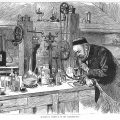Currently, German history didactics is focusing on narrative competence. The resultant normative overload, is not unproblematic – to say the least.
Tag Archive for ‘Empiricism (Empirie)’
Frameworks of Knowledge and the “Big Picture”
Although many history educators agree that one of the purposes of school history should be to help students assemble the historical knowledge into coherent “big picture” historical narratives…
To Conceptually Grasp the Dictatorships of the 20th Century
Although adolescents label the GDR as a repressive and undemocratic system, the classification as a dictatorship is clearly less decided. This is less founded…
“Whitewater Canoeists” or “Rule Applying Automats”?
The question in History Didactics isn’t always so much as what the students need to know but what a history teacher actually needs to know in order to be able to work successfully.
What Makes the World Change? Young People and History
Street demonstrations and movements that have occupied schools and universities have moved the Brazilian political scene. Traditionally, young people have been regarded as the embodiment of novelty and change.
Successful Public History – A Question of Empirical Evidence?
One of the many tasks of Public History is to analyze the extensive offerings of products mediating history in the public domain. The question whether the success of such an understanding of Public History could be measurable has not yet been asked very often – not least …
On the Grammars of School History: Who Whom?
Grammar has a reputation for tedium, and a well-deserved one, perhaps,… Historical grammars can, however, be a valuable tool for appraising historical thinking and for reflecting on how school history is made and understood.
Historical Thinking. Diagnose Learning Processes Instead of Assessing Performance
“If you wish to improve teaching and learning, you have to attend to teaching and learning.” With this statement, Bruce A. VanSledright suggests to leave the current fixation on large-scale assessment of historical thinking behind and to turn research attention to the description and diagnosis of individual learning processes.







